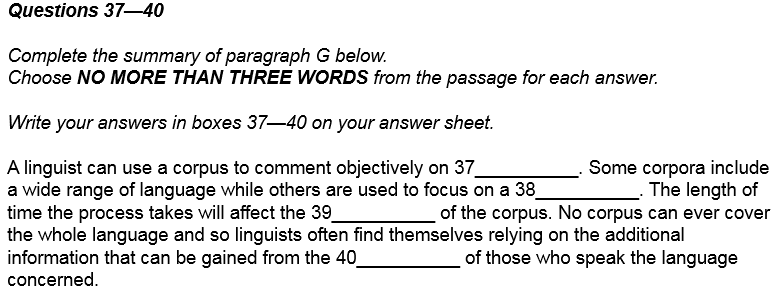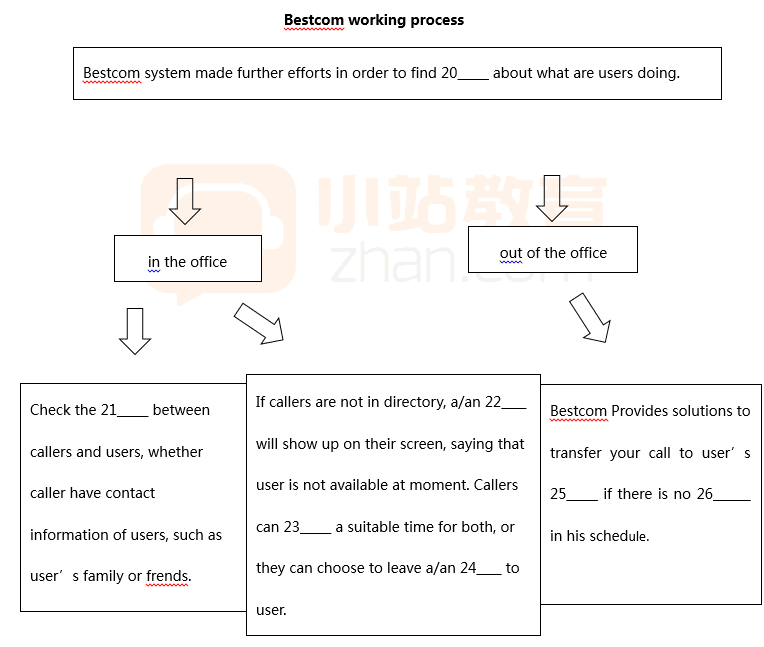gre阅读考试的分数十分重要,这是众所周知的事情,那么gre阅读成绩该如何提升呢?下面小编就和大家分享gre阅读考试成绩如何快速提升,希望能够帮助到大家,来欣赏一下吧。
gre阅读考试成绩如何快速提升?
生词问题
许多GRE阅读测试文章来自国外原创期刊或杂志。它们涵盖了科学技术、自然、环境保护、社会、文化、工作、生物、地理等多个领域。因此,遇到生词是合理的。但有些考生遇到生词就失去了信心。他们非常慌乱。他们打破了原来的阅读节奏和速度。当他们问问题时,他们因为生词而陷入困境。因此,问题不仅没有解决,而且影响了后续问题的速度和时间。可以说,“一旦开始,他们就到处移动”。在这方面,专家认为新词的出现是不可避免的,只要你有一个基本的词汇,就可以一个一个地彻底新词的问题。
有时新词属于更专业的词汇。他们的出现不是为了考察考生的词汇,而是为了考察考生的适应能力和判断能力。gre阅读怎么练习尤其是标题中出现的所谓生词,可以使不好的事情变得更好,成为考生寻找答案的线索词。
有时生词的意义可以直接在上下文中获得。gre阅读中遇到的生词的相当一部分意义可以通过各种方式猜测得到。因此,在生词周围或语境中寻找解释是一种有效的方法。
时间问题
gre阅读考试备考很多学生面对GRE阅读考试,都会感叹时间不够,往往考生来不及读完整篇文章。问题解决速度达不到要求的原因有很多,如词汇、阅读方法和解决问题的能力。此外,还有一个重要因素:没有权衡,没有衡量问题的优先性。鉴于GRE考试模式不倒箭,如果遇到很难阅读的问题,就要花很多时间去定位和分析那些难以保证正确率的问题。建议你直接猜出答案,然后输入下一个问题,不要在这些问题上花太多时间。只有学会选择或拒绝,才能保证解决以下问题的时间,从而弥补损失,取得更好的gre阅读成绩提升。
理解问题
很多考生在日常练习和考场遇到需要查找关键词和中心句的问题时,总是跟着感觉走,完全失去了方向和焦点,这直接导致了在面对问题时很难回到原来的位置。因此,考生应学会在阅读过程中直接寻找线索,即中心句的关键词。建议我们在日常的课堂和习题中总结试题的特点,用一两个词覆盖整个题目。使用关键词来定位答案,更多地关注目标,更有方向性。
其实,只要有经验的考生都会知道,在最后一个错误造成之后,就应该尽量避免在同类问题面前再次犯错。这样,就更容易知道他们的弱点在哪里。如何提高gre阅读的效率,是掌握gre阅读解决问题的技巧,避免其弱点失分的关键。
GRE阅读:法国二月革命
In February 1848 the people of Paris rose in revolt against the constitutional monarchy of Louis-Philippe. Despite the existence of excellent narrative accounts, the February Days, as this revolt is called, have been largely ignored by social historians of the past two decades. For each of the three other major insurrections in nineteenth-century Paris—July 1830, June 1848, and May 1871—there exists at least a sketch of participants’ backgrounds and an analysis, more or less rigorous, of the reasons for the occurrence of the uprisings. Only in the case of the February Revolution do we lack a useful description of participants that might characterize it in the light of what social history has taught us about the process of revolutionary mobilization. Two reasons for this relative neglect seem obvious. First, the insurrection of February has been overshadowed by that of June. The February Revolution overthrew a regime, to be sure, but met with so little resistance that it failed to generate any real sense of historical drama. Its successor, on the other hand, appeared to pit key socioeconomic groups in a life-or-death struggle and was widely seen by contemporary observers as marking a historical departure. Through their interpretations, which exert a continuing influence on our understanding of the revolutionary process, the impact of the events of June has been magnified, while, as an unintended consequence, the significance of the February insurrection has been diminished. Second, like other “successful” insurrections, the events of February failed to generate the most desirable kinds of historical records. Although the June insurrection of 1848 and the Paris Commune of 1871 would be considered watersheds of nineteenth-century French history by any standard, they also present the social historian with a signal advantage: these failed insurrections created a mass of invaluable documentation as a by-product of authorities’ efforts to search out and punish the rebels.
Quite different is the outcome of successful insurrections like those of July 1830 and February 1848. Experiences are retold, but participants typically resume their daily routines without ever recording their activities. Those who played salient roles may become the objects of highly embellished verbal accounts or in rare cases, of celebratory articles in contemporary periodicals. And it is true that the publicly acknowledged leaders of an uprising frequently write memoirs. However, such documents are likely to be highly unreliable, unrepresentative, and unsystematically preserved, especially when compared to the detailed judicial dossiers prepared for everyone arrested following a failed insurrection. As a consequence, it may prove difficult or impossible to establish for a successful revolution a comprehensive and trustworthy picture of those who participated, or to answer even the most basic questions one might pose concerning the social origins of the insurgents.
12.1. According to the passage, “a useful description of participants” (lines 11-12) exists for which of the following insurrections of nineteenth-century France?
I. The July Insurrection of 1830
II. The February Revolution of 1848
III. The June insurrection of 1848
IV. The May insurrection of 1871
(A) I and III only
(B) II and IV only
(C) I, II, and III only
(D) I, III, and IV only
(E) II, III, and IV only
12.2. It can be inferred from the passage that support for the objectives of the February Revolution was
(A) negligible
(B) misguided
(C) fanatical
(D) spontaneous
(E) widespread
12.3. Which of the following, best describes the organization of the second paragraph?
(A) The thesis of the passage is stated and supporting evidence systematically presented.
(B) Two views regarding the thesis presented in the first paragraph are compared and contrasted.
(C) Evidence refuting the thesis presented in the first paragraph is systematically presented.
(D) The thesis presented in the first paragraph is systematically supported.
(E) The thesis presented in the first paragraph is further defined and a conclusion drawn.
12.4. It can be inferred from the passage that the author considers which of the following essential for understanding a revolutionary mobilization?
(A) A comprehensive theory of revolution that can be applied to the major insurrections of the nineteenth century
(B) Awareness of the events necessary for a revolution to be successful
(C) Access to narratives and memoirs written by eyewitnesses of a given revolution
(D) The historical perspective provided by the passage of a considerable amount of time
(E) Knowledge of the socioeconomic backgrounds of a revolution’s participants
12.5. Which of the following can be inferred about the “detailed judicial dossiers” referred to in line 49?
(A) Information contained in the dossiers sheds light on the social origins of a revolution’s participants.
(B) The dossiers closely resemble the narratives written by the revolution’s leaders in their personal memoirs.
(C) The information that such dossiers contain is untrustworthy and unrepresentative of a revolution’s participants.
(D) Social historians prefer to avoid such dossiers whenever possible because they are excessively detailed.
(E) The February Revolution of 1848 produced more of these dossiers than did the June insurrection.
12.6. Which of the following is the most lical objection to the claim made in lines 38-39?
(A) The February Revolution of 1848 is much less significant than the July insurrection of 1830.
(B) The backgrounds and motivations of participants in the July insurrection of 1830 have been identified, however cursorily.
(C) Even less is known about the July insurrection of 1830 than about the February Revolution of 1848.
(D) Historical records made during the July insurrection of 1830 are less reliable than those made during the May insurrection of 1871.
(E) The importance of the July insurrection of 1830 has been magnified at the expense of the significance of the February Revolution of 1848.
12.7. With which of the following statements regarding revolution would the author most likely agree?
(A) Revolutionary mobilization requires a great deal of planning by people representing disaffected groups.
(B) The objectives of the February Revolution were more radical than those of the June insurrection.
(C) The process of revolutionary mobilization varies greatly from one revolution to the next.
(D) Revolutions vary greatly in the usefulness of the historical records that they produce.
(E) As knowledge of the February Revolution increases, chances are good that its importance will eventually eclipse that of the June insurrection.
gre阅读考试成绩如何快速提升相关文章:
★ 高三英语听力考试成绩提升技巧
★ 英语学习方法
★ 高三考试英语听力成绩提升技巧
gre阅读考试成绩如何快速提升
上一篇:gre考试提分还得利用限时训练
下一篇:gre阅读考试备考要掌握什么





